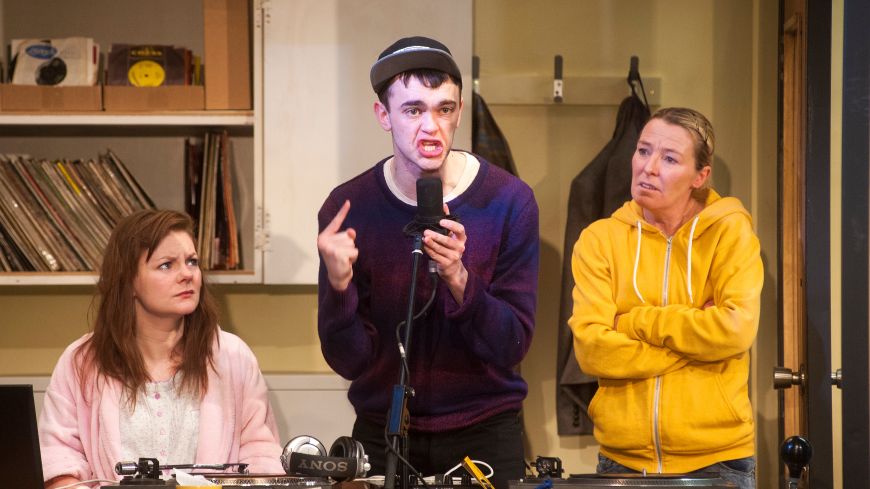
It is no mean feat to telescope a six-part television series in to a 2 and a half hour stage play but that is just what Donna Franceschild has done superbly with Takin’ Over the Asylum, her radical 1994 tragi-comedy originally broadcast by BBC Scotland.
Set in a Glasgow mental hospital, the story revolves around ‘Ready’ Eddie McKenna (Iain Robertson) who has come as a DJ with a case load of ‘60s sounds to try to breathe new life in to the stagnant atmosphere of St Jude’s. Eddie is currently doing one of a long line of hopeless jobs: a double glazing salesman. His heart is not in selling and he is world weary from rejections of his dream of being a professional DJ.
Once let in to St Jude’s by the aggressive, power loving nursing assistant Stuart (Martin McCormick), Eddie is faced with the inmates. Some are sitting hypnotized by the telly; Rosalie (Caroline Paterson) is obsessively cleaning every possible surface; Fergus (Grant O’Rourke) is perpetually plotting his next escape; young Campbell (Brian Vernel) is totally manic and talks non-stop. Among this, Eddie notices Francine (Helen Mallon) crying quietly in the corner.
The DJ station becomes the focal point of most of the patients and a catalyst to exposing talents, ambitions and possibilities that have been ignored. Dreams start to spin like Eddie’s turntables and people who one minute seemed at the end of the road, suddenly were seeing potential in the new and exciting situation.
In this top of the range production, whose set from Alex Lowde, with its depressing rain running constantly down the windows, its kicked walls and greying veils making it every inch an institution, we see the utter vulnerability of the human condition along with the inevitable dark humour that accompanies it. The hallmark of great writing is that fantastic balance of dark and light; tragedy and comedy and Franceschild, drawing on much of her own experiences and encounters in mental health, has achieved that with this fast paced, vigorous piece.
It is performed by a stellar Scottish cast whose versatility is jaw-dropping and one’s eyes have to be everywhere on stage to catch the individual nuances from this big cast, like Gregor Firth as the apologetic Hector whose body language was nothing short of brilliant. Martin McCormick’s swaggering nurse Stuart with the permanently knitted brows is a portrait of minor megalomania. Caroline Paterson appeared in the original TV series in another role and played a convincing tensely kirby–gripped Rosalie whose compulsive behaviour was weighted with false guilt.
Iain Robertson was a perfect Eddie McKenna as he found a kind of sense and meaning among the apparent chaos of St Jude’s. Molly Innes and Grant O’Rourke gave their usual top class performances in their respective roles of Evelyn the administrator and Fergus the unsung genius. Helen Mallon’s constantly anxious face silently told of her damage long before her self-harming character Francine managed to reveal it.
Young Brian Vernel, who is still in training at the Royal Conservatoire of Scotland, was the fastest tongue in the west as the never still; never quiet (unless sedated) Campbell. His energetic stage presence is remarkable and his feat of delivering the machine gun monologues was highly impressive. His take on Martin Luther King’s famous speech, I Have a Dream, displayed the universality and vitality of the simple yet profound statement.
Subtly updated to encompass mobile phones and computers, and with superb in –your- blood music from the likes of Aretha Franklin, The Supremes, The Four Tops and Fontella Bass, this is a wild and impassioned portrayal of what we all are really, the walking wounded.
Show times
13 March-6 April 2013
Tuesday – Saturday at 7.45pm
Matinees: 20, 23, 27, 30 March and 3 and 6 April at 2.30pm
Tickets
£14.50-£29

